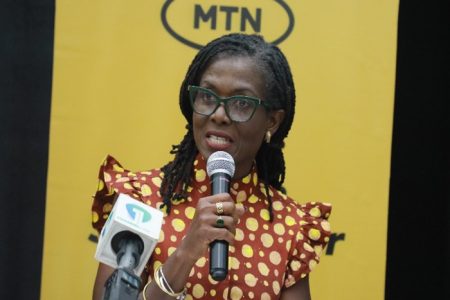MTN Group is embarking on a series of strategic partnerships with satellite companies, including Starlink, in a bid to enhance its service delivery across various operation areas.
This was announced by the Chief Corporate Services and Sustainability Officer (CCSSO) of MTN Ghana, Madam Adwoa Wiafe, during the company’s annual Media Forum.
“In terms of partnerships, MTN Group is collaborating with Starlink, so there is an opportunity there,” she said. “We are also exploring satellite technology across countries, with pilot programs already underway in some regions.”
Madam Wiafe assured Ghanaians that MTN remains committed to embracing future technologies to provide customers with the best possible experience.
Expanding network coverage and reducing costs
To further boost service quality, MTN intends to expand its broadband coverage as part of its network expansion strategies. This move is expected to increase access while reducing communication costs.
Key initiatives outlined by Madam Wiafe include device financing, digital education, zero-rated sites, and partnerships with original equipment manufacturers (OEMs) under the company’s coverage, handsets, affordability, service bundling, and education and ease of access (CHASE) framework.
Additionally, MTN is set to increase its data network capacity by expanding its fiber network for transport and home use, upgrading power and cooling systems, and constructing new network sites.
These enhancements are aimed at improving connectivity and reliability for customers across MTN’s footprint.
Exploring Satellite Connectivity to Reach Remote Areas
MTN is also venturing into satellite-based solutions to overcome challenges posed by difficult terrain and sparsely populated areas, where traditional cellular rollouts can be uneconomical.
The company’s partnership with low Earth orbit (LEO) satellite providers is expected to extend mobile connectivity to more rural and remote regions while improving network resilience.
LEO satellites, which orbit the Earth at altitudes between 160 and 2,000 kilometers, offer shorter signal travel times, leading to lower latency.
This makes them ideal for real-time communication, such as video conferencing and online gaming.
Direct-to-cellular and fixed connectivity
MTN is currently exploring two major satellite solutions.
The first involves direct-to-cellular technology, designed to augment network access in traditionally underserved regions. This solution is device-agnostic, meaning that it works seamlessly with existing mobile devices without requiring any modifications.
The second solution leverages LEO satellites to provide critical fixed connectivity for enterprise customers, as well as efficient backhaul connectivity for MTN cellular sites.
This is particularly important for remote and rural locations, where satellite solutions can offer a more affordable and efficient alternative to traditional infrastructure.
Ongoing satellite trials
To advance these satellite initiatives, MTN has launched multiple projects, including upcoming direct-to-cell trials with Lynk Global in South Africa and Ghana.
The company is also in discussions with AST SpaceMobile for trials in Nigeria and South Sudan, as well as with SpaceX’s Starlink, with enterprise-grade trials already underway in Rwanda and Nigeria.
In parallel, MTN is in talks with Eutelsat OneWeb for a planned pilot in South Africa.
The company is also working with Omnispace to explore the use of S-band satellite services, aimed at expanding MTN’s wireless service portfolio across both MTN and Omnispace’s markets.
Driving innovation and connectivity in Africa
MTN’s commitment to enhancing connectivity across Africa is evident in its forward-looking approach to integrating satellite technology with its existing infrastructure.
By partnering with leading satellite providers and exploring cutting-edge solutions like LEO satellites, MTN is positioning itself to overcome connectivity challenges and improve network access for underserved regions.
With these innovative partnerships, MTN aims to offer improved communication services, strengthen its presence in remote areas, and provide customers with a seamless, high-quality experience. As the company continues to explore the future of satellite technology, customers can expect even greater improvements in connectivity and service delivery across Africa.
- Painter accused of stealing BoG cables granted GH₵1m bail - 2 April 2025
- Police amend charges and facts in Ahmed Suale murder case - 2 April 2025
- Inflation declines slightly to 22.4% in March - 2 April 2025

